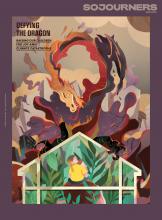Climate change
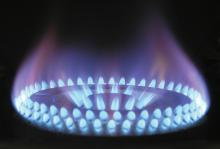
TUESDAY, MARCH 21, is the day for our big national action against the giant banks that are backing the fossil fuel industry.
Why March 21? Because it’s — if you think about it — 32123, simply too good a palindrome to pass up. It’s a countdown to the end of something (our economy’s blithe support for energy sources that scientists tell us we must now forego) and a count up to the real start of a possible transition.
We’ll be out in force across the country, picketing Citibank, Chase, Bank of America, and Wells Fargo branches: Those four giants lead the world in lending to Big Oil. Their offices look like benign tenants of strip malls across America, but in truth each should have a giant smokestack coming out the top, to remind us just how much carbon they produce. (If you have $125,000 in one of these institutions, which lends it out to build pipelines and frack wells, then that money is producing more carbon in a year than all the heating, flying, driving, cooling, and cooking of an average American.)

Wrestling with the complicated legacy of Christians and international adoption.

THE IMAGE THAT first brought Ugandan climate activist Vanessa Nakate to many people’s attention is one that doesn’t even include her.
In January 2020, Nakate was invited to join five other young activists in a climate demonstration during the World Economic Forum annual meeting in Davos, Switzerland. An Associated Press photographer snapped a photo of Nakate standing with European climate activists Luisa Neubauer, Greta Thunberg, Isabelle Axelsson, and Loukina Tille. But when the AP published the photo that afternoon, Nakate wasn’t in it.
“Even now, well over a year after being cropped out of that photograph, it’s hard for me to talk about what happened,” wrote Nakate in her 2021 book A Bigger Picture: My Fight to Bring a New African Voice to the Climate Crisis. “By cutting me out of the photo they’d originally sent to global media organizations, the AP had denied an African activist a chance to be seen and, possibly, her message to be acknowledged.”
While the AP did some “soul-searching” following the incident, Nakate used the moment to ignite an overdue conversation about the whiteness that has long plagued the global environmental justice movement. “Being cropped out of the photo changed me,” she wrote. “I decided, from my perspective as a young African woman, that I would dedicate as much of my time as possible to addressing the many interlocking facets of the climate crisis, environmental justice, and gender discrimination — and to do so without apology or fear of erasure.”
Nakate founded the Rise Up Movement to amplify the voices of climate activists from Africa and launched a fundraising campaign for the Vash Green Schools Project to bring solar panels and cookstoves to schools across Uganda. At 25, she’s busy. And faced with a global climate emergency, it makes sense. “I don’t often get asked what recharges me,” Nakate told me when we spoke in early August. “But for me, it’s my relationship with the Holy Spirit.”
Raised in an Anglican family, Nakate became a born-again Christian as a teenager. “Activism can be very hard and prayer and attending services (or, in Covid times, watching online) have been extremely important sources of love, grace, and support,” she wrote in the acknowledgments of A Bigger Picture.
“If I feel distraught or disturbed by anything, I know the Holy Spirit will remind me of the peace that surpasses all human understanding,” she later told me. I spoke with Nakate via Zoom about her Christian faith, the role social media plays in her activism, and why we can’t eradicate poverty without addressing the climate crisis. — Christina Colón
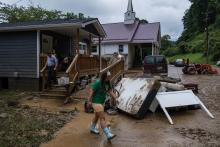
Sally Monroe is an elder at First Presbyterian Church of Hazard, Ky. With her husband Lawrence, she spoke with Sojourners’ Mitchell Atencio.
OUR HOUSE IS completely gutted. All the Sheetrock is gone, the flooring’s gone. It’s just a shell. The water came very quickly. Our neighbor who had a house on River Caney got about two and a half feet of water in his house, but it came very rapidly, and their house was washed away. Our situation is different. We live in the valley a half-mile from the river. We had no idea how high the water could get. We didn’t get the current, and the water came up rapidly ... some pictures from this flood where buildings were just washed off their foundations — it’s horrible to see those homes like that.
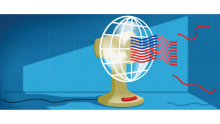
IN AUGUST, President Joe Biden signed the Inflation Reduction Act (IRA), the most significant legislation ever passed by Congress to address climate change. But what happens now? After all, the days aren’t getting any cooler — a recent study by the First Street Foundation suggests that in 30 years more than 100 million Americans could experience heat index temperatures over 125 degrees Fahrenheit. In our polarized politics, there is already a great deal of confusion and obfuscation about what this historic bill will do. A related question: How will the IRA affect what people of faith do about the existential threat of climate change?
The IRA invests $369 billion over the next 10 years into tax incentives for renewable energy and electric vehicles, domestic manufacture of batteries and solar panels, and pollution reduction. The idea is to make renewable energy and electric vehicles more affordable, both to manufacture and to buy, thus encouraging more consumers to adopt them. The IRA also targets methane pollution by imposing an escalating fee on some oil and gas companies that emit too much methane in their operations and increasing royalty rates paid to the government on methane extraction from public lands. The IRA includes an unprecedented investment of $60 billion into environmental justice initiatives, including clean energy and emission reduction for low-income and disadvantaged communities, block grants for community-led projects in disadvantaged communities to “address disproportionate environmental and public health harms related to pollution and climate change,” and funding to reconnect communities divided by highways.
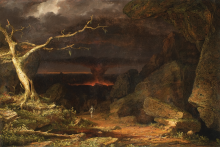
THE EARTH SEEMS ablaze. Each year, flames appear more savage, more far-ranging, and more inescapable. The prophecy of Ezekiel is coming to pass: “They shall go out from one fire, and another fire shall devour them” (15:7). The planet is, as some see it, careening toward a secular apocalypse.
To be caught between two fires is an old notion. But a lot has changed since Ezekiel’s warning. Today, we do not have to cope with two fires but with three. The first is the fire that has burned as long as terrestrial vegetation has existed. The second is the fire that humans tamed from the first. The third involves burning fossil fuels. The three fires together are shaping our world, which makes humanity uniquely suited to serve as a steward, for we are Earth’s fire creature, the only one with the systematic capacity to start and stop flame.
WESTERN CIVILIZATION HAS a long heritage of fire myth, lore, religion, and science. Early Indo-Europeans seem to have worshiped a fire deity. Of the 12 ancient Olympians, two were gods of fire — Vesta for the hearth, Vulcan for the forge. Ritual fire became a fundamental practice of Zoroastrians, among the first of the monotheisms. New colonies or dislocated peoples would take fire from their mother city to literally “rekindle” its offspring. The hearth fire, most famously in Rome, stood for both family and state. Pyromancy, the practice of divining meaning in flames, is an old practice.
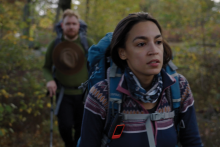
The Green New Dealings
To the End follows women of color as they advocate for the Green New Deal and face opposition within their political party. The documentary spotlights Sunrise Movement’s Varshini Prakash, Justice Democrats’ Alexandra Rojas, the Roosevelt Institute’s Rhiana Gunn-Wright, and Rep. Alexandria Ocasio-Cortez. Jubilee Films
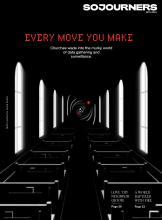
How do marketing techniques, such as surveillance and data gathering, fit with the mission of the church?
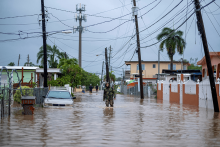
O God of all creation, as ocean waters warm, / we grieve the devastation that comes with violent storms. / We pray for people struggling— who need your help and grace / on every flooded island and in each flooded place.

The June release of a Climate Vigil The Porter’s Gate Worship Project aims to nudge Christians toward climate action, but it isn’t alone among contenders to inspire the climate movement. For over 20 years, Carolyn Winfrey Gillette, a Presbyterian minister from New York, has written hymns for the times, including one for the 2021 UN climate talks held in Scotland and several to recognize increasing natural disasters such as wildfires, hurricanes, and floods. Fossil Free PCUSA, a campaign within the Presbyterian Church (USA) has used hymns in protests, including songs by Christian artist Matthew Black.
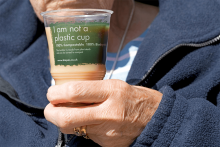
Amid the avalanche of rogue supreme court decisions that have come out in the past few months, there’s one that has slid under the radar: West Virginia v. EPA.

One hundred- and eight-degrees Fahrenheit. According to the University of Washington, that June day in 2021 was the hottest day ever recorded in the city of Seattle. And my fourth-floor apartment did not have air conditioning.
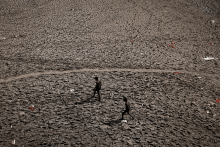
Christian, Muslim, and Jewish leaders joined United Nations officials on Monday in urging financial institutions to stop bankrolling activities that are driving climate change, including ending support for new fossil fuel projects.
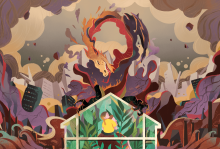
“MOMMY, WHY DON'T people care about the trees?”
I lay on the floor feeling the weight in my chest. I can hear a constellation of starlings gathering in the silver maple out my window. Every breath takes work to keep the airways open against the anxiety that has grasped my body. My youngest’s question was haunting me.
How on earth are we supposed to parent in this moment? Climate catastrophe is upon us. We will know its touch, if we haven’t already, and our children will certainly know it. How do we keep grounded as we move from one crisis to the next?
I reach for a cassette labeled “Jeanie Wylie-Kellermann workshop, 1991.” I blow off the dust and stick it in the tape player. Out comes a voice that was once as common as daily bread: my mother’s voice. Sixteen years after her death, I hear her, clear and steady.
She reads Revelation 12: “A woman clothed with the sun, with the moon under her feet, with 12 stars on her head for a crown. She was pregnant and in labor, crying out in pain as she was about to give birth.” I listen as my belly, still etched with the stretch marks from when my own body groaned with creation, rises off the floor. “The dragon stood before the woman about to deliver, to devour her child the moment she gave birth.”
I keep breathing; yes, I know this old dragon. And I cry out with this woman and hunger for her company.
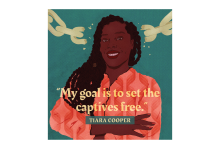
IN THIS MONTH'S cover feature, Lydia Wylie-Kellermann wrestles with one of the central dilemmas of parenting: the tension between protecting our children and empowering them for action. That tension is made more pointed, and the stakes elevated, by the crises we face—including, perhaps most urgently, climate change. Though I imagine that balance has been one of the more challenging aspects of raising children since the invention of parenthood.
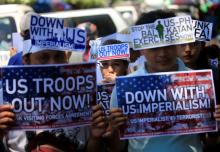
Due to climate change, people — entire tribes and cultures — are losing their homes and are being displaced from their lands. Indeed, the United States military needs to be held accountable for polluting the planet. For example, if preventive measures and legislation like the Green New Deal are not enacted to curb U.S. imperialism, more Indigenous peoples will perish due to climate disasters.

In the new apocalyptic movie, religious expression reveals what really matters to people when the world is ending. As a planet-killing comet comes hurtling toward Earth, some characters, like Kate Dibiasky (Jennifer Lawrence), a Ph.D candidate studying astronomy at Michigan State, and her professor, Randall Mindy (Leonardo DiCaprio) take action; others turn toward denial. But all of them, at some point in the movie, pray. How they pray on their final days on Earth says a lot about what they value.
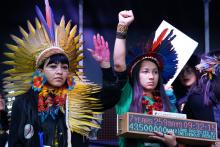
Colonial logic, when applied to political systems, protects power and controls the public narrative. When world leaders use generic terms like “humanity” or phrases like “all humans are responsible for the crisis,” it conceals the responsibility of governments and large corporations. By pointing to humanity in general, they imply that we are all equally responsible for the climate crisis and invisibilize the efforts of Indigenous leaders in the fight for climate justice.

IN JULY, my children and I crouched at the edge of the continent along a trail spitting hikers onto Kalaloch Beach 1 in Olympic National Park. Eyes at dirt level, we marveled at a hidden-in-sight banana slug, oozing exquisite slime and swiveling its tentacles. Off Interstate 90 in Montana, we held our breath as a bald eagle swooped over a deer grazing just across the fence from our car. Throughout our epic road trip from Illinois to the Pacific Northwest, I kept saying, “Wow, but ...”
My wonder was tinged with a sense of impending loss. With fires devouring unthinkable amounts of forest just over the next mountain range and smoke clouding the skies for 1,500 miles, the beauty in front of me seemed to be slipping away. In the end, I took home more pain than joy.
Many of us live with this bone-deep grief over what we have lost in the natural world, and with anticipatory grief over what is about to be lost. It is right to feel this deeply, to lament and give voice to our pain in community. And then what? Grief, pain, and anger can move us to action, but they only carry us so far. To sustain our work, we need joy.
